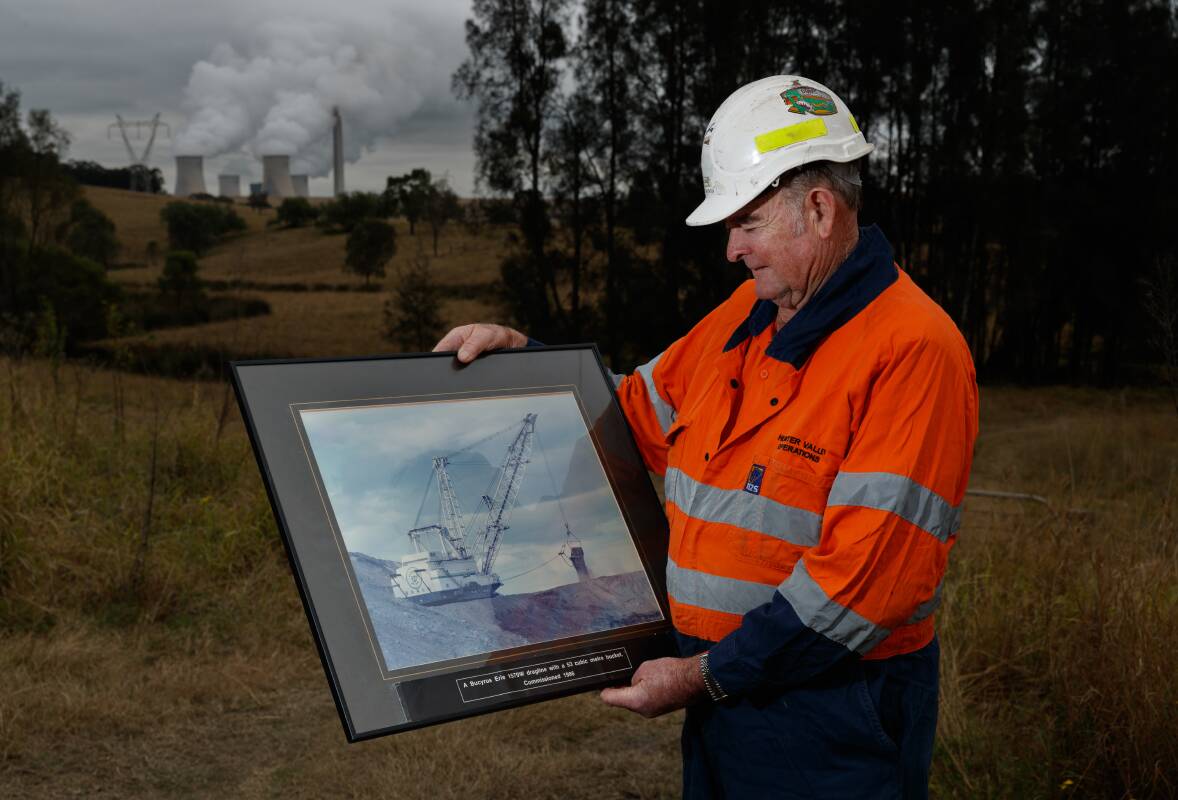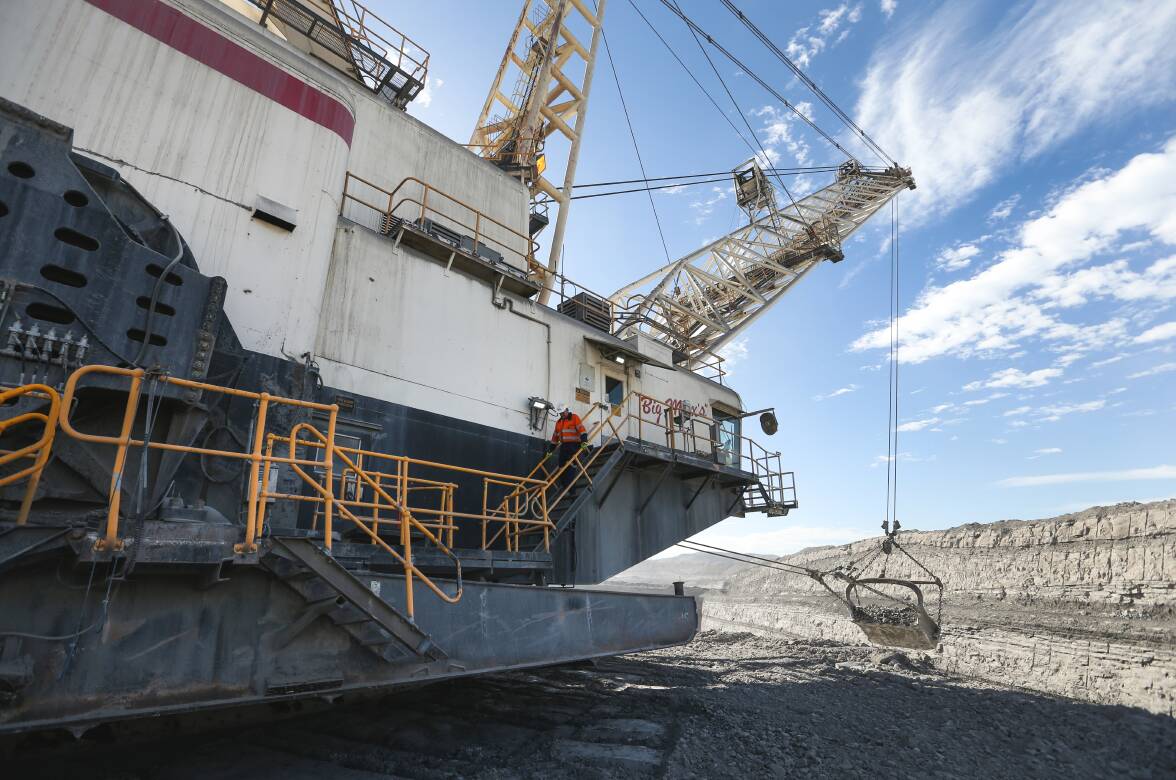
Muswellbrook's Peter Constable spent his last day as a coal miner on Thursday after more than 50 years on the job.
The 73-year-old worked at the Hunter Valley Operations open-cut coal mine near Singleton since 1969, when he was 20, putting him among the world's longest working coal miners ever.
"That's 53 years, one month and seven days," Mr Constable said.
He kept working beyond the standard retirement age because he enjoyed the job.
The mine, previously known as Foybrook-Howick open cut, helped keep the lights on in NSW for decades by providing coal to Bayswater Power Station.
Nowadays the mine's coal is exported to Asia.
"We have some of the best quality coal in the world. We had contracts to Taiwan, Korea and Japan for years. Japan wanted the best quality coal they could get," he said.
He recalled the days of working without air-conditioning and noted a big difference in the size of the machinery from when he first started.
"Little tiny trucks would hold only 8 or 10 tonne. Now you have trucks carting 360 tonne," he said.
Mining machinery once had "cables and pulleys" before everything was converted to hydraulics.
He worked on a monster of a machine called the dragline for 45 years.
"The dragline strips overburden - that's the rock and the dirt. It digs that away to get to the coal seam. They call it strip mining."
Part of his reason for retiring is that the dragline is planned to be stopped in favour of mechanical diggers, known as a truck and shovel operation.

"They've been saying they'll shut the draglines down, so I said it's time for me to get out," he said.
He believed the dragline's economics remained good.
"If you're a shareholder, you'd keep the draglines going."
Mr Constable has seen a lot of change in coal mining over the decades.
"When I first started, we only worked day and afternoon shifts. We didn't work night shifts until the end of 1978. A lot of people hate shift work, but it never worried me."
Up until his retirement on Thursday, he was still working full-time. This involved 12.5-hour shifts 14 days a month.
"You do two on, a couple off, then three on. You work every second weekend. During the week, it's two days and two nights.
"We've never had 9am to 5pm in the industry, but I've worked nearly every roster you can poke a stick at."
His last day on the job ironically involved training. He trained a lot of miners in his time.
"I was one of the first full-time trainers in the industry. I did my training course at Newcastle University and got my certificate on August 26, 1984.
"I started training at Howick open-cut on October 15, 1984. I've got nothing written down, I just remember it all."
He has a photographic memory, "a built-in computer I call it."
He's earned a few quid, too.
"I have enough to keep me going for the rest of my life."
Asked to describe his thoughts on coal, he said it was an "asset to the country".
"It's black gold," he said.
Mr Constable grew up on a farm at Cassilas in the Upper Hunter "before moving to town" [Muswellbrook], after his dad got a job there in 1963.
He initially drove tractors on the farm, pulling logs out of the hills while his dad was away shearing.
"We supplied timber to a saw mill and to the shire," he said.
He grew up in a family of seven brothers and five sisters. Eight of them ended up working in the mines.
"We had no TV as kids. We had 300 acres on the farm and we always had something to do. We were never inside."
The farm had pigs, goats, sheep, cattle, chickens and wheat. Scientists might suggest his farm upbringing helped his immune system.
He hasn't had COVID. He received the recommended vaccines, too.
"I have a good doctor who looks after me. He said my immune system is very healthy and I should fight off everything that's going. I've lived a healthy life all my life," he said.
He rarely gets sick and he had very few days off work.
"I've had a pretty good life, as far as health goes. My doctor said I may as well enjoy the rest of it while I can. So I took notice of that."
He said work never caused him stress.
"I just loved being outdoors working. I probably only watch an hour of TV a day, the news or something like that of a nighttime."
He's been married to his wife Lavinia for 53 years. They have three children and five grandchildren.
"I got married October 4, 1969. It was just after I started work at the mine."
He has no plans to leave Muswellbrook in the near future.
"I'll use it as my base until I think I'm ready to go anywhere. I have a son in Newcastle, a daughter in Canberra and a son in Adelaide," he said.
His son David works at the Hunter Valley Operations mine and one of his brothers still works in the mines.
"Eddie is still going at 60. I have a nephew working at Mount Arthur and a niece at Mount Thorley," he said.
"Another two brothers who passed away worked at Ravensworth and Mount Arthur. An older brother also worked at Hunter Valley mine."
Mr Constable has lived in the same house at Muswellbrook for 51 years.
"This town will probably never go ahead much more than it is now, but I don't think it will go backward either," he said.
He sees parallels between Muswellbrook and Cessnock.
Cessnock had many underground mines years ago.
"They have none now," he said, noting that the town managed to keep its economy going after mining.
He believes a container terminal at the Port will be a big part of helping the Hunter, as coal declines.
"They've got to do something to keep the workhorse going. If they build a container terminal in Newcastle, that'll take most of the people from mining and associated industry. It's got to go ahead."
Mr Constable's message to the state and federal governments on that front was "the sooner they get rid of the red tape and get it going, the better off we'll all be".
Nevertheless, he believes the Hunter Valley mine has decades ahead of it. The mine recently applied for an extension to 2050.
"You cannot get rid of coal until you have a reliable energy source that will do the same job as coal," he said.
"Wind power and all that stuff will feed domestic use, not big industries like steel and smelters."
When he first started, there were only three open-cut mines in the Hunter.
Asked about the effects of open-cut mining on the landscape, he said he could envision the land having a future in agriculture, man-made lakes and hydro-electric power.
"When they rehabilitate it and fill in the voids, it'll be better than it was before."







